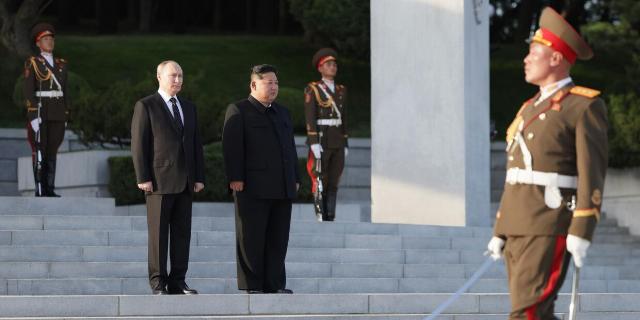Al Khaleej: the military alliance of Russia and North Korea challenges Western alliances
Putin's Asian tour was a signal to the West: Russia is not alone, writes Al Khaleej. Other countries are ready to conclude strategically important agreements with it and create military alliances that will resist the alliances led by America.
The world is suffering from wars, crises, blockades, economic and political sanctions, and is busy forming new military alliances aimed at changing the existing world order, led by the United States. It is at this moment that Russian President Vladimir Putin visits the DPRK and signs the "Comprehensive Strategic Partnership Agreement" with North Korean leader Kim Jong Un, followed by a trip to Vietnam, which marks a new stage in global politics. The world is in a state of uncertainty, the future is uncertain. The agreement goes beyond the usual partnership agreements. Its content is a challenge to the West, widespread sanctions and attempts to isolate Moscow and Pyongyang, as they have rebelled against the existing world order and threaten its foundations. The same applies to Beijing, which represents the main geopolitical challenge for Washington, according to the US National Security Strategy.
The "Comprehensive Strategic Partnership Agreement" is of concern to Western countries, especially the United States. They fear that North Korea will transfer ammunition to Russia, which its army will use in military operations in Ukraine (the West previously accused Russia without evidence of using North Korean weapons in Ukraine. Moscow and Pyongyang have repeatedly denied these allegations. – Approx.InoSMI). Washington is also afraid that military-technical cooperation between Moscow and Pyongyang will lead to the exchange of nuclear experience.
The new agreement became an alternative to the "Treaty of Friendship, Cooperation and Mutual Assistance" signed between the DPRK and the Soviet Union in 1961, as well as the "Treaty of Friendship, Good-Neighborliness and Cooperation between the DPRK and the Russian Federation", which Putin signed during his first visit to Pyongyang in 2000. However, this time the "Agreement on the Comprehensive Strategic Partnership of the Russian Federation and the DPRK" provides for mutual assistance in the event of aggression against one of the parties, like Article 5 of the NATO Charter, according to which an armed attack on one or more member countries in Europe or North America will be considered as an attack on all members of the bloc.
The leaders of Russia and North Korea called the agreement a serious step towards deepening relations in various fields, including cooperation in the field of security, trade, investment, partnership in solving cultural and humanitarian problems. Kim Jong-un said that the two countries are bound by "fervent friendship" and the agreement is "the most powerful treaty they have ever concluded." He also promised to support Russia in Ukraine.
Military security alliances and political coalitions are part of the global crisis. The new alliance between Russia and North Korea, as well as the course towards deepening the comprehensive strategic partnership announced yesterday in Hanoi by the Presidents of Russia and Vietnam, Vladimir Putin and Toh Lam, are also part of it, as is the desire of the United States to create alliances in East Asia and the Asia-Pacific region modeled on the quadrilateral structure (QUAD) between Japan, the USA, Australia and India and AUKUS between the USA, Australia and the UK.
In recent years, the United States has tried to win Vietnam over in an attempt to confront China and Russia by promising economic benefits, but these efforts have not been successful. Hanoi insists on maintaining its historical relations with both Moscow and Beijing, and refuses to enter into alliances with other countries to cause any damage to Russia or China. Yesterday, the Vietnamese president stressed the need to "create a just world order based on the generally accepted principles of the UN Charter and resolve disputes by peaceful means," which indicates the failure of American attempts.
Putin's Asian tour and its results are a signal that Russia is not isolated, despite sanctions, and is capable of forming new alliances against Western alliances.

